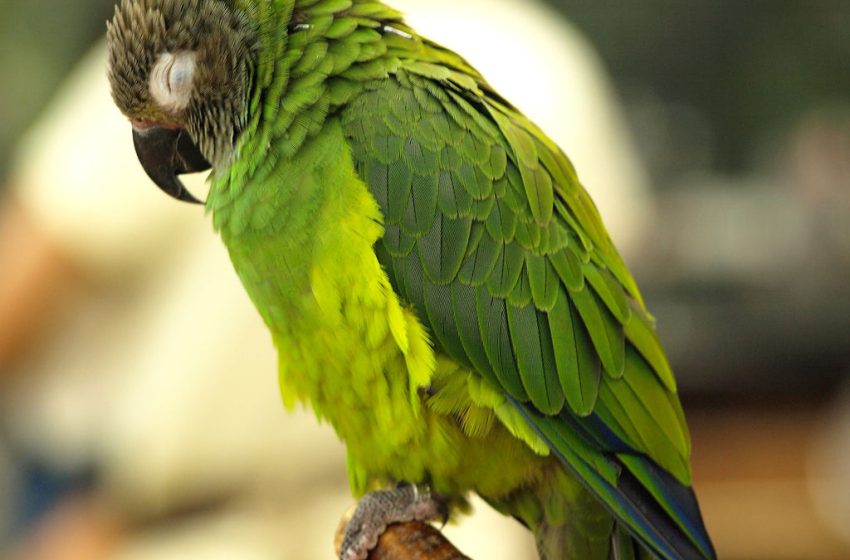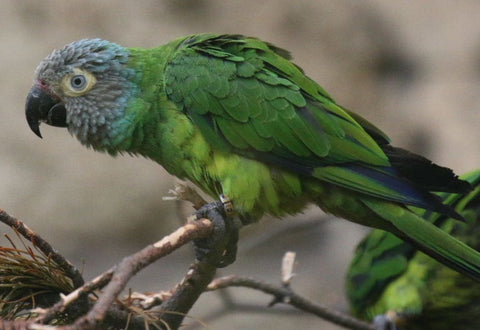The Dusky Conure: A Comprehensive Guide
- Pets
 freyaparker
freyaparker- September 24, 2024
- 13

The Dusky Conure, also known as the  , is a charming and playful parrot that has captured the hearts of bird enthusiasts around the world. Known for its vibrant personality and striking appearance, this species is a popular choice for pet owners looking for a companion that is both entertaining and affectionate.
, is a charming and playful parrot that has captured the hearts of bird enthusiasts around the world. Known for its vibrant personality and striking appearance, this species is a popular choice for pet owners looking for a companion that is both entertaining and affectionate.
Origin and Habitat
Natural Habitat
Dusky Conures are native to South America, primarily found in the countries of Brazil and Paraguay. They inhabit a variety of environments, including forests, woodlands, and savannas. These areas provide ample opportunities for foraging and nesting, which are crucial for their survival in the wild.
Social Structure
In their natural habitat, Dusky Conures are highly social birds that typically form flocks. These flocks can vary in size and often include other parrot species. The social nature of these birds plays a significant role in their behavior, both in the wild and when kept as pets.
Physical Characteristics
Size and Appearance
Dusky Conures are medium-sized parrots, measuring about 10 to 12 inches in length. They have a distinctive appearance characterized by their dark gray heads, which give them their name. The rest of their body is adorned with bright green plumage, accented by hints of yellow on the wings and tail.
Color Variations
While the traditional Dusky Conure is predominantly green and gray, there are color mutations available in the pet trade. These variations include yellow-sided and cinnamon Dusky Conures, which exhibit unique and stunning color patterns.
Behavior and Personality
Playful Nature
Dusky Conures are known for their playful and inquisitive demeanor. They love to explore their surroundings and engage in various activities. Their intelligence makes them excellent problem solvers, and they often enjoy puzzles and toys that challenge their minds.
Affectionate Companions
These birds are not only playful but also highly affectionate. Dusky Conures often form strong bonds with their owners, seeking out interaction and companionship. They may enjoy cuddling, preening, and spending time on their human’s shoulder, making them ideal pets for those looking for a loving companion.
Care and Maintenance
Diet
A balanced diet is essential for the health of a Dusky Conure. Their diet should consist of high-quality pellets, fresh fruits, and vegetables. Some safe fruits include apples, bananas, and berries, while leafy greens like kale and spinach provide necessary vitamins and minerals.
Housing
When it comes to housing, Dusky Conures need a spacious cage that allows for plenty of movement and exploration. The cage should be equipped with perches, toys, and places to hide, mimicking their natural environment as closely as possible.
Social Interaction
Due to their social nature, Dusky Conures require regular interaction with their owners. Daily playtime outside the cage is crucial for their mental and physical well-being. Engaging them in activities like training sessions, games, and socialization with other pets can help keep them happy and stimulated.
Training and Socialization
Importance of Training
Training is an essential aspect of owning a Dusky Conure. Positive reinforcement methods, such as treats and praise, work best for this intelligent species. Teaching them basic commands can enhance their bond with you and help establish good behavior.
Socialization Techniques
Early socialization is vital for a Dusky Conure. Exposing them to various people, environments, and experiences can help them become well-adjusted and less fearful of new situations. Gradually introducing them to different sounds, sights, and interactions will build their confidence.
Health Considerations
Common Health Issues
Like all pets, Dusky Conures are prone to certain health issues. Some common concerns include obesity, feather plucking, and respiratory problems. Regular veterinary check-ups and a proper diet can help prevent these issues.
Signs of Illness
Owners should be vigilant for any signs of illness, which can include changes in behavior, appetite, or droppings. Early detection and intervention are key to ensuring a long and healthy life for your Dusky Conure.
Breeding Dusky Conures
Breeding Behavior
Breeding Dusky Conures requires careful consideration and preparation. In the wild, they typically breed during the rainy season, which influences their nesting behavior. Providing a suitable breeding environment is essential for successful reproduction.
Nesting and Care for Young
Once the female lays eggs, she will incubate them while the male provides food and protection. After hatching, both parents play a role in feeding and caring for the chicks until they are ready to fledge.
The Dusky Conure in Popular Culture
Pet Popularity
The Dusky Conure’s playful personality and affectionate nature have made it a popular choice among pet owners. Many bird enthusiasts appreciate their engaging behavior and stunning appearance, leading to a growing demand in the pet trade.
Representation in Media
Dusky Conures have also made appearances in various media, including movies and television shows, further increasing their visibility and popularity as pets.
Conclusion
In summary, the Dusky Conure, or Dusky Headed Conure, is a delightful and affectionate bird that can make a wonderful pet for the right owner. Their playful nature, social behavior, and stunning appearance make them a favorite among bird enthusiasts. By understanding their needs and providing proper care, you can ensure a happy and fulfilling life for your dusky conure
Final Thoughts
If you’re considering adding a Dusky Conure to your family, it’s essential to do thorough research and be prepared for the commitment required. With proper care, training, and love, these birds can bring joy and companionship for many years to come. Whether you’re a first-time bird owner or an experienced enthusiast, the Dusky Conure is sure to enrich your life with its playful spirit and affectionate nature.

